

 |
 |
 |
|
| About Us |
|
Read Past Issues | Resources | Composer Links |
|
|
Copland & Mexico!
|
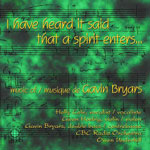
I Have Heard it Said That a Spirit Enters … / Music of Gavin Bryars Composer: Gavin Bryars Performers: CBC RO Orchestra, Holly Cole Gavin Bryars never failed me yet. Nearly 75 minutes of glorious melancholy from one of the two or three truly great ones, including three wonderful songs sung by Canadian jazz singer Holly Cole, a violin concerto, a gorgeous riff on the last fragment of music Wagner wrote before he died, and a long, haunting, extended adagio featuring the man himself on double bass. Better, it does not get. |
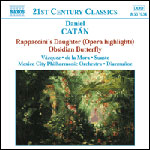
Rappaccini's Daughter (Highlights) / Obsidian Butterfly Composer: Daniel Catan Performer(s): Vazquez, Mora, Suaste, Diazmunoz Naxos - #8557034 Daniel Catán, Mexico's best living composer, was born in Mexico City in 1949. A Sephardic Jew of Russian descent, he spend his first 14 years in Mexico, relocating to England to study philosophy and music. After several years at Sussex and Southampton, he moved to the United States, where he earned his Ph.D. at Princeton under the tutelage of Milton Babbitt. Catán's highly melodic style owes more to Mahler's lieder than to Babbit, however. Rappaccini's Daughter was premiered in 1994 by the San Diego Opera and established Catán as a force in "magic realist" opera. |
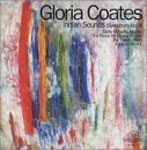
Indian Sounds (Symphony No. 8) Composer: Gloria Coates Conductor: Jorgen Wirrmann Ensemble: Musica-viva-ensemble Dresden New World Records - #80599 Gloria Coates, one of the most original voices in modern music, is best known for her symphonies but here she draws on her experience as a singer to create a work filled with ghostly voices that hint at horrors too awful to behold. The eighth symphony for voices and orchestra draws texts from Seneca, Winnebago, and Plains Indian songs. Coates once more demonstrates that modernism and humanism are not only compatible impulses--together, they can be life-enhancing.
|
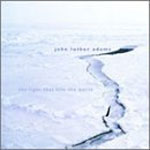
Light That Fills the World Composer: John Luther Adams Cold Blue Label - #10 Darkness and light are defining realities for the people, plants and animals who live in far northern climes and the abrupt and possibly deadly boundaries that separate these two extremes lie at the heart of Adams austure music. Brillant, crystalline waves of sound conjure a deceptively beautiful landscape in which light is life and darkness can quickly lead to extinction. Adams’ music is never less than spellbinding.
|
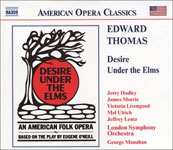
Desire Under the Elms Composer: Edward Thomas Conductor: George Manahan Performers: Jerry Hadley, James Morris, et al. Naxos - #8669001-02 Desire Under the Elms was composed in 1978 and has been performed only rarely since. Thomas describes it as "a folk opera" and that is about right--the work is built of melodies that are simple and uncomplicated. Pleasant enough--perhaps too easy to like--but the real mystery here is how the producers landed big stars like Jerry Hadley and James Morris for a vehicle that frankly isn't going anywhere. Still, if American opera is your obsession, you've got to have it. |
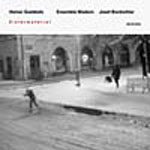
Eislermaterial Composer: Heiner Goebbels Ecm Records - #461648 Goebbels pays homage to a formative influence, German composer Hanns Eisler (1898-1962). At the heart of the work are the touching songs of exile, which Eisler wrote together with Brecht, sung by German actor Josef Bierbichler. There are also montages from an original documentation with Eisler's voice, newly arranged excerpts from Eisler's chamber music, fragments from an unpublished string quartet a newly discovered composition for solo clarinet, and Eisler-inspired improvisations
|
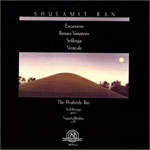
Shulamit Ran Composer: Shulamit Ran New World Records - #80554 Two solo works—Fantasy Variations (1979/rev.1984) for cello and Verticals (1982) for piano—and two works for trio, Excursions (1980) and Soliloquy (1997) form the basis of this splendid display of Ran's highly individual approach to atonality, which is more drama than science, more harmony than dissonant, unexpectedly lush, and filled with an exaggerated sense of movement.
|
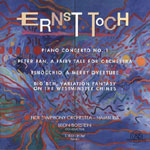
Piano Concerto No. 1 Composer: Ernst Toch Performer: Crow, piano; NDR—Hamburg Symphony Orchestra, Botstein, conductor New World Records # 80609 The Ernst Toch rediscovery marches on with an excellent performance of his Piano Concerto 1, written in Germany before the composer fled Hitler's rule and settled in Hollywood. Severe, atonal, and not-at-all user friendly, the concerto is balanced on this CD by three lighter pieces-- Pinocchio, Peter Pan, and Big Ben--which sound like they were written by a man getting his resume in order for Louis B. Mayer. |
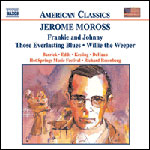
Frankie and Johnny Composer: Jerome Moross Performer(s): Barrick, Edds, Kesling, Rosenberg Naxos - #8559086 "But, he was her man, nearly all the time..." Wonderfully atmospheric rendering of the complete ballet-- Frankie and Johnny--commissioned by Ruth Page of the Chicago Ballet. To the degree that he is remembered at all, Moross is best-known for the film score of The Big Country but even bigger things were expected of him. Born in New York on August 1, 1913, Morass began piano lessons at age five and composing by age eight. In 1924, he became the youngest child ever to graduate from a New York City Public School up to that time. |
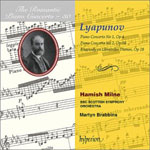
Piano Concerto Nos. 1 & 2; Rhapsody on Ukranian Themes Composer: Sergey Mikhaylovich Lyapunov Conductor: Martyn Brabbins Performer: Hamish Milne Hyperion - #67326 Another terrific piano concerto by a composer you never heard of in Hyperion's huge and indispensible catalog of romantic piano concerti. Continuing proof that there is piano music of worth beyond Rachmaninoff and Grieg.
|
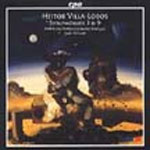
Symphonies Nos. 3 & 9 Composer: Heitor Villa-Lobos Conductor: Carl St. Clair Cpo Records - #999712 ) Villa-Lobos has undergone a resurgence in recent years as more of his symphonic and chamber work has appeared in first-rate performances. The result has been a much-deserved elevation in stature from composer of charming little tunes for the guitar to major composer in virtually all genre. Fabulous and committed playing.
|

All Rivers at Once Composer: Phillip Schroeder Performer: Duo Savage Capstone - # 8709) Hints of Mahler and the late Romantics run through these lovely pieces performed by Duo Savage, consisting of Susan Savage (oboe and English horn) and Dylan Savage (piano and synthesiser). This is haunting, beautiful, music that transports the listener to a world that is considerably more genteel than one in which we live.
|
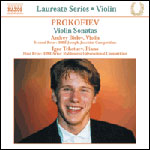
Violin Sonatas Composer: Sergey Prokofiev Performer(s): Andrey Bielov Naxos - #8555904 Another brilliant prodigy making kid's play out of pieces that many adult players find gnarly, indeed. This could be the start of something big. |
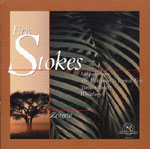
Eric Stokes Composer: Eric Stokes Performer: Michael Lowenstern, Heather Barringer, et al. New World Records - #80596 "Music is for the people," Eric Stokes once wrote. " For all of us: the dumb,the deaf, the dogs and jays, handclappers, dancing moon watchers, brainy puzzlers, abstracted v whistlers, finger-snapping time keepers, crazy, weak, hurt, weed keepers, the strays. The land of music is everyone’s nation—her tune, his beat, your drum—one song, one vote." Once mentioned in the same breath as Ives and Cage, Stokes has fallen off the charts in recent times. This is the first recording devoted entirely to his work and its shows a lively musical intelligence that deserves further listening. |
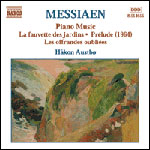
Piano Music Vol. 4 Composer: Olivier Messiaen Performer: Hakon Austbo Naxos - #8554655 Messiaen is this year's flavor of the month as record companies continue to turn out dozens of versions of his works both large and small. This Naxos series is the best bargain of the lot, with wonderful, well-recorded performances that reflect the growth of Messiaen's reputation as one of the giants of 20th century music. |
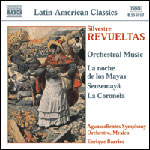
Orchestra Music Composer: Silvestre Revueltas Conductor: Enrique Barrios Aguascalientes Symphony Orchestra Naxos - #8555917 All the greatest hits of Mexico's best dead composer, performed marvelously by a sympathetic orchestra, at a bargain basement price. If you don't know Revueltas' work, shut down the computer immediately, run to the nearest CD store, plop down your money and prepare to be amazed. |
 |
Publisher: Duane Harper Grant (212) 582-4153 Editors: Jerry & Suzanne Bowles (212) 582-3791 Contributing Editor: Deborah Kravetz (C) Sequenza/21 LLC 2000 |
 |
Search WWW Search www.sequenza21.com |